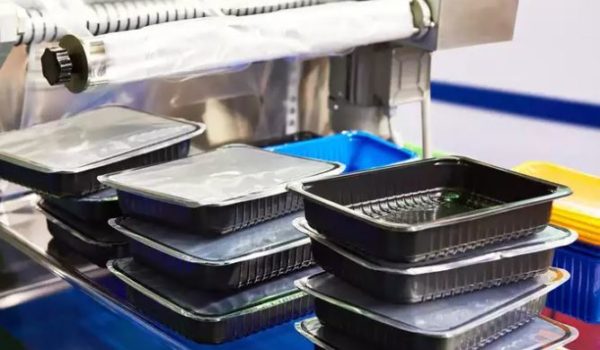
In an age where plastic pollution is a global crisis, it is imperative for individuals to make conscious choices to reduce their impact on the environment.
While many people take strides to cut down on single-use plastics by carrying reusable bags or using refillable water bottles, there is one aspect often overlooked: the type of plastic used in food packaging and serviceware.
Specifically, the prevalent use of black plastic in restaurants has come under scrutiny due to its detrimental effect on the environment and potential health risks, making it essential for consumers to refuse food served in such containers.
In this article, we will talk about the potential health risks caused by black plastic and why such containers should be avoided completely.
Why this plastic is black in colour?
Black plastic food packaging, commonly found in takeout containers and disposable cutlery, is not recyclable in most recycling facilities. This is primarily due to the nature of black plastic, which is made by adding carbon black pigments to the plastic resin during the manufacturing process. The pigments darken the plastic, making it difficult for optical sorting systems used in recycling plants to differentiate between black plastic and other materials. Consequently, a significant amount of black plastic ends up in landfills or incinerators, exacerbating the plastic waste problem and contributing to environmental pollution.
The impact of black plastic on health
Research has indicated that black plastic may pose health risks due to the presence of carbon black pigments. Carbon black contains polycyclic aromatic hydrocarbons (PAHs), which are classified as possible human carcinogens by the International Agency for Research on Cancer (IARC). These compounds have been linked to various adverse health effects, including respiratory problems and cancer. In addition, the use of black plastic food containers raises concerns about the potential migration of harmful chemicals into the food we consume. Several studies have revealed that certain chemicals, such as phthalates and bisphenol-A (BPA), commonly found in plastic packaging, can leach into food, especially when exposed to high temperatures. This means that when hot food is served in black plastic containers, there is a higher likelihood of these chemicals contaminating the food being consumed, which could have detrimental effects on human health.
The expert’s take
Dr Aarati, founder of Amulya Boondh Foundation recently posted a video on her Instagram page and made people aware about this black-coloured plastic. Her post read, “Black plastic is extremely difficult to recycle and actually poses massive difficulties to recycling centres, because it contaminates other plastics. The Near Infrared Radiation (NIR) sorting practiced in many other countries along with informal manual sorting. Conventional plastic-sorting facilities utilize Near Infrared Radiation, or a light beam that bounces off the plastics, to identify and sort them. The technology, however, has a low sensitivity to black pigments and other dark colours, which absorb the light from the infrared radiation. Therefore, it can’t be sorted.”
She further stater, “Black plastic is most often sorted incorrectly or really, not sorted at all. Black plastic most often ends up in the trash rather than into the recycling centre where it can be turned into new products. So, if it isn’t contaminating plastic that can be recycled rendering that plastic un-recyclable, too – then it’s hurting the environment in a different way, by going to the incinerator or a landfill. Black plastic is toxic on its own, because it contains highly poisonous additives and flame retardants. In fact, any hot food or liquid like Curries, Soups, and Gravies should not come in contact with any type of or any coloured plastic.”
Where it is used?
These single-use containers are often used for quick, on-the-go meals, which are frequently consumed by many people across the globe. As a result, people face increased exposure to potential health risks associated with black plastic consumption, exacerbating existing health inequalities. The very reason why we must refuse black plastic is because restaurants have a vital role to play in addressing the issue of black plastic usage. By transitioning to more sustainable alternatives, such as biodegradable or compostable materials, they can significantly reduce their environmental footprint. Additionally, adopting transparent and recyclable packaging options can enhance consumer trust and promote healthier practices for both people and the planet.
The bottom line
As consumers, we hold the power to drive change through our choices. By refusing food served in black plastic, we can send a clear message to restaurants that we prioritize our health and the well-being of the environment. Opting for restaurants that prioritize sustainable and eco-friendly packaging can incentivize others to do the same, leading to a broader shift towards more responsible practices within the food industry.




